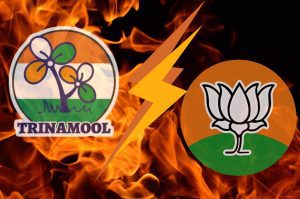West Bengal Firecracker Explosion: West Bengal has been rocked by a series of tragic explosions linked to illegal firecracker manufacturing units. These incidents have resulted in a significant loss of life and property, raising serious concerns about public safety, regulatory oversight, and the enforcement of laws governing hazardous industries. This article delves into the details of these tragic events, examines the underlying issues, and explores the responses from various stakeholders.
West Bengal Firecracker Explosion: The Tragic Incidents
Gas Cylinder Explosion in South 24 Parganas
On March 31, 2025, a catastrophic explosion occurred in the Dholahat area of South 24 Parganas district. The blast, originating from a gas cylinder, ignited stored firecrackers within a residential house, leading to a massive fire. Seven individuals lost their lives, including four children, and several others sustained injuries. The explosion’s intensity caused the house to collapse, and the ensuing fire spread rapidly, causing panic among the local populace.
Eyewitnesses described the horror of seeing their neighbors trapped under debris and flames engulfing the building within minutes. Rescue operations were delayed due to the intensity of the fire, and firefighters struggled to contain the flames before they spread to adjacent houses. Families lost not just their loved ones but their entire homes and belongings in an instant. Local authorities later revealed that the house was illegally storing firecrackers, which magnified the explosion’s impact.
Investigations into the incident revealed shocking negligence, with gas cylinders being stored improperly alongside explosive materials. Experts have pointed out that such accidents could be prevented if strict regulations were in place for hazardous materials storage in residential areas. Despite repeated incidents of similar nature, illegal activities continue to thrive due to weak enforcement of safety guidelines.
West Bengal Firecracker Explosion: Firecracker Factory Explosion in Duttapukur
Earlier, on August 27, 2023, a powerful explosion devastated an illegal firecracker manufacturing unit in Duttapukur, North 24 Parganas district. The blast resulted in the deaths of at least eight individuals and injured several others. The explosion’s force was so immense that it demolished the two-story building housing the unit and damaged over 50 neighboring houses.

The blast was so severe that it was heard miles away, shattering windows in homes within a 500-meter radius. Residents recalled feeling tremors similar to an earthquake before seeing thick smoke fill the air. Emergency response teams worked tirelessly to extract survivors from the rubble. Many bodies were found in an unrecognizable state, and rescue teams faced difficulties in identifying victims.
Reports indicated that the firecracker unit was operating illegally and had been flagged multiple times in the past. However, no concrete action had been taken to shut it down, highlighting the failure of authorities to enforce safety protocols. Families of the deceased demanded strict action against those responsible, calling for harsher penalties for individuals operating such hazardous units without proper permissions.
West Bengal Firecracker Explosion: Recurring Pattern of Illegal Firecracker Manufacturing
These incidents are not isolated. West Bengal has a troubling history of explosions linked to unauthorized firecracker production:
- Egra Explosion (May 2023): An illegal firecracker unit in Egra, Purba Medinipur district, exploded, resulting in 12 fatalities. The blast underscored the dangers posed by unregulated manufacturing practices. The explosion’s impact was so severe that pieces of the factory’s roof were found over a kilometer away, and rescue teams worked for over 24 hours to clear the debris.
- Budge Budge Incident (May 2023): A blast at an illegal firecracker godown in Budge Budge, South 24 Parganas, claimed three lives, including a minor. The explosion occurred while family members were reportedly making firecrackers on the rooftop of a building. Witnesses mentioned that the house had been doubling as a storage facility for years despite repeated complaints from locals.
These tragedies reveal a persistent issue of illegal firecracker manufacturing units operating within densely populated areas, often with inadequate safety measures and, allegedly, with the tacit approval or neglect of local authorities.
West Bengal Firecracker Explosion: Underlying Issues and Challenges
Regulatory Oversight and Enforcement
Despite existing regulations governing the production and storage of fireworks, enforcement remains lax. Illegal units often operate without licenses, proper safety protocols, or adherence to guidelines, posing significant risks to workers and residents. The recurrence of explosions suggests systemic failures in monitoring and regulating these hazardous operations.
Authorities often conduct raids in the aftermath of such incidents, but these measures fail to address the root cause of the problem. Many factory owners reopen their illegal businesses within months, using political connections and bribery to avoid legal consequences. Safety standards, meant to be rigorously followed, are often ignored, resulting in these avoidable catastrophes.
Political Allegations and Administrative Lapses
The aftermath of these incidents has seen political parties trading accusations. Opposition parties have alleged that local authorities and ruling party members are complicit or negligent, allowing illegal operations to flourish. For instance, following the Duttapukur explosion, the Bharatiya Janata Party (BJP) demanded an investigation by the National Investigation Agency (NIA), citing concerns over law and order. Conversely, the ruling Trinamool Congress (TMC) accused opposition parties of politicizing tragedies.


Political analysts argue that illegal firecracker factories continue to function because they generate significant revenue, with many of them linked to influential local leaders. Until accountability is established at the highest levels, real change remains elusive.
West Bengal Firecracker Explosion: Economic Pressures and Employment
Economic hardships and limited employment opportunities compel many individuals to seek work in these illegal units despite the known risks. The promise of livelihood often outweighs safety considerations, perpetuating a cycle of hazardous employment. Many workers are underpaid, unskilled laborers who are unaware of the extreme dangers involved in firecracker manufacturing. Child labor is also rampant in these factories, with minors working in unsafe environments to support their families.
Addressing this issue requires not only stringent enforcement but also the creation of alternative, safer employment opportunities. Government intervention is crucial to providing vocational training programs that can help workers transition to safer industries.
West Bengal Firecracker Explosion: Government Response and Measures
Formation of a Committee
In response to these recurring tragedies, the West Bengal government has initiated several measures. After the Egra explosion, a committee led by the Chief Secretary was established to investigate illegal firecracker units and recommend corrective actions. The committee was tasked with submitting its findings within two months, but no significant changes have been observed in the enforcement of safety laws.
Crackdown on Illegal Units
Law enforcement agencies have conducted raids in areas like Budge Budge and Maheshtala, seizing large quantities of illegally stored firecrackers and raw materials. These operations aim to dismantle unauthorized units and prevent further incidents. However, critics argue that these raids are often temporary measures, with illegal units reopening after a few months once the scrutiny dies down.
Promotion of Green Firecrackers
The state has expressed intentions to promote the manufacturing of green firecrackers, which are considered safer and more environmentally friendly. However, the implementation and transition to such practices remain in nascent stages, with manufacturers reluctant to shift to a new model due to cost constraints and lack of incentives.
The series of explosions in West Bengal’s illegal firecracker manufacturing units serve as grim reminders of the urgent need for comprehensive action. Beyond the immediate loss of life and property, these incidents erode public trust in governance and highlight systemic failures. A proactive approach involving stringent law enforcement, economic incentives, and public awareness is imperative to prevent future tragedies. Unless strict policies are implemented and followed, these disasters will continue to claim innocent lives.
DO FOLLOW:
Also read: Home | Channel 6 Network – Latest News, Breaking Updates: Politics, Business, Tech & More

